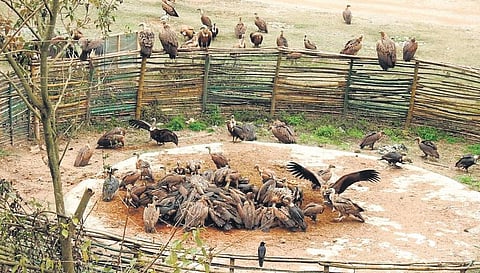

CHANDIGARH: Bad omen. An exploiter out to milk a situation. Or just someone you don’t like. Vultures may be maligned commonly. But as this ‘vulture restaurant’ in a Pathankot village shows, they should be a cherished lot.
Vultures, considered natural scavengers because they only eat carcasses, have a lot to be proud of. They remove pathogens in the environment and provide a vital link in environmental protection, including human health.
The birds, however, had almost vanished in Punjab in the mid-1980s.
It was found that the dead birds contained excessive amounts of the drug, Diclofenac, given to cattle to relieve pain and inflammation.
Vultures that ingested this drug suffered kidney and liver failure and died. The drug is now banned in India.
The situation is, however, different today. The ‘vulture restaurant’ at Chandola in Dhar Kalan has seen their population rise by 10 times in a decade, up from less than 35 then.
The ‘vulture restaurant’ was set up in 2009 by the Union Environment Ministry and the Punjab government. The idea was to ensure a congenial habitat where dead carcasses were fed to the vultures after testing.
A lab-cum-office was made at Dhar. A feeding platform was set up in half an acre at Chandola. The project lasted until 2012. At least 600 vultures appeared thanks to these efforts.
However, the shortage of funds led to the shelving of the project.
The project returned to life last year at the intervention of then deputy commissioner of Pathankot, who set aside Rs 14 lakh for it. Officials say they have spotted a flock of over 350 vultures following the availability of safe carcasses.
Chief Wildlife Warden, Punjab, Parveen Kumar, says the monitoring of the carcasses has led to quicker reproduction of vultures.
“We accept carcasses only after a veterinarian confirms that it has no traces of any harmful drug,’’ says Kumar, adding that scavenging by vultures is helping to keep the environment pathogen-free.
In 2019, parliament was informed by the then Union Environment Minister Prakash Javadekar that the population of vultures in the country has come down from 40 million to 19,000 in 30 years.
There are three species of endangered resident Gyps vultures – white-backed vulture, long-billed vulture and slender-billed vulture whose population is 6,000, 12,000 and 1,000, respectively.